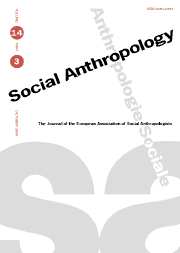Experiments in interdisciplinarity
Published online by Cambridge University Press: 22 February 2005
Abstract
A social anthropologist venturing into an interdisciplinary field at the University of Cambridge describes some of the hazards of equipping herself with ethnographic skills. The ethnographic object is the Cambridge Genetics Knowledge Park, a government-funded enterprise intended to create ‘knowledge [about human genetics]…validated through the critical appraisal of research findings, ethical, legal and social analysis and the inclusion of a consumer perspective’. It is deeply concerned with law, norms and society. The author will attempt to explain the indirection of her approach to studying this phenomenon – through an activity (a seminar series) organised off-site, focused on means (interdisciplinarity) not ends, and raising an apparently extraneous topic (forms of ownership) for discussion.
Une anthropologue sociale qui s'aventure dans un champ interdisciplinaire à l'université de Cambridge décrit quelques uns des risques qu'il y a à s'équiper de compétences ethnographiques. L'objet ethnographique est le Genetics Knowledge Park de Cambridge, une entreprise financée par le gouvernement qui vise à créer du ‘savoir [à propos de la génétique humaine]…s'appuyant sur l'évaluation critique de résultats de recherche, sur des analyses éthiques, légales et sociales, et sur l'inclusion d'une perspective de consommateur’. Le parc s'intéresse de près aux lois, aux normes et à la société. L'auteur essaiera d'expliquer le manque de direction de son approche dans l'étude de ce phénomène – à travers une activité (une série de séminaires) organisés hors du site, se concentrant sur les moyens (interdisciplinaires) et non les fins, et soulevant un sujet de discussion apparemment inhabituel (les formes de propriété).
Eine Sozialanthropologin, die sich in das interdisziplinäre Feld an der Universität von Cambridge vorwagt, beschreibt einige Hindernisse beim sich Aneignen ethnographische Fähigkeiten. Das ethnographische Studienobjekt ist der Cambridge Genetics Knowledge Park, ein finanziell von der Regierung getragenes Projekt mit dem Ziel, ‘der Wissensfindung [zur Humangenetik]…die durch kritische Beurteilung der Forschungsergebnisse sowie durch ethische, rechtliche und soziale Analyse, unter Einbezug einer Konsumentenperspektive, Gültigkeit schafft’. Rechtliche, normierende als auch gesellschaftliche Aspekte spielen eine schwerwiegende Rolle. Mittels einer anderwärts organisierten Initiative (einer Seminarserie), die sich auf Mittel (Interdisziplinarität) und nicht auf den Zweck konzentriert und ein scheinbar unwesentliches Thema (Besitzformen) in Diskussion stellt, macht die Autorin den Versuch, ihre sie auf Umwege führende Annäherung an das zu untersuchende Phänomen darzulegen.
Una antropóloga social inmersa en un campo interdisciplinario en la Universidad de Cambridge describe algunos de los peligros en la adquisición de habilidades etnográficas. El objeto etnográfico es el Parque de Conocimiento Genético de Cambridge, una empresa financiada por el gobierno cuyo objetivo es crear ‘conocimiento [sobre genética humana]…validado por medio de la recepción crítica de los resultados de investigación, un análisis ético, legal y social y la incorporación de una perspectiva del consumidor’. Una profunda preocupación por la ley, las normas y la sociedad. La autora intenta explicar el desvío en su perspectiva de estudio – a través de una actividad (una serie de seminarios) organizada extramuros, enfocada sobre los medios (interdisciplinareidad) y no los fines, y proponiendo un tema aparentemente extraño (tipos de propiedad) a discusión.
- Type
- Special section: Three lectures on the future of anthropology in Europe
- Information
- Copyright
- © Cambridge University Press 2005
Footnotes
- 6
- Cited by




